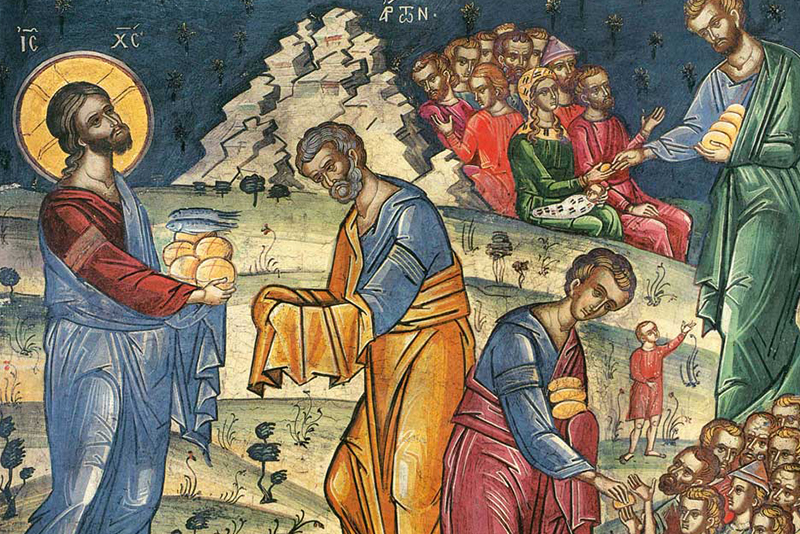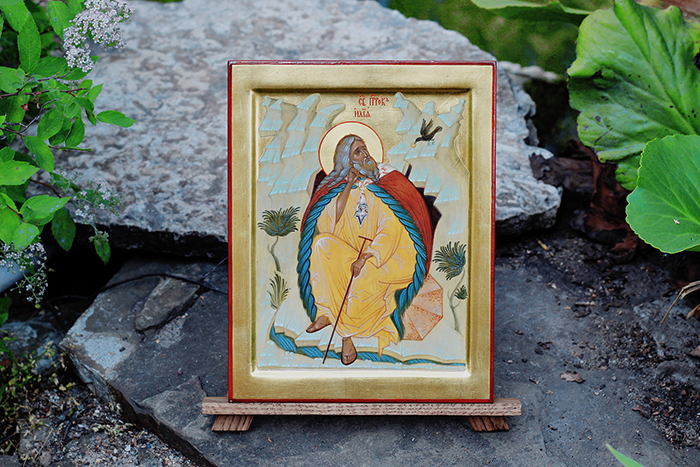
Luke 6: 17-23
Phil. 1: 27-2: 4
St Matthew the Evangelist begins to expound this conversation of the Lord Jesus Christ in the following way: “And seeing the people, He went up the mountain; and when he sat down, his disciples came to him. And He, having opened His mouth, taught them…” According to Matthew, this conversation was called “Sermon on the Mount”. At the same time St Luke writes that it happened “on a level place”. Which account should we give preference to? It seems that Matthew gives only a short introduction, in a hurry to get to the main point. Luke, in his usual manner, “having had perfect understanding of all things from the very first” (Luke 1: 2-3), restores the details more precisely, introducing no conflict with other versions and yet making everything fall into place. The mountain that the Lord ascended, as usual, to “spend all night in prayer to God” also remains in its place. “When the day came, He called His disciples to Him and chose twelve of them, whom He called Apostles.” And then, “came down with them and stood on a level place, with a great crowd of his disciples.”
However for some reason, of the nine beatitudes, cited by Matthew, Luke cites only the first few. He begins just like Matthew: “Blessed are you who are poor, for yours is the kingdom of God.” Who are these “poor” people? We see beggars in the street all the time. They are there asking for food. They do not demand anything or promise anything in return. They know that they do not and will not have anything to offer. They have no legal right to anything or the strength to earn it with their own hands. They are ready to endure any humiliation, as long as they are not sent away. The feeling of one’s spiritual poverty puts a person in a similar situation, standing day and night with a hand out before God and asking, as the publican did while beating his chest and not daring to raise his eyes, “God, have mercy on me, a sinner!” (Luke 18:13) In other words, the feeling of one’s spiritual poverty is a direct impetus to true prayer. A true man of fervent prayer would never attract attention to his prayer just as it would never occur to a beggar to be proud of his begging. At the same time a true man of prayer will never say anything like: “I have received everything, and there is no need to ask for more.” Even when he feels the Lord approaching him, his prayer will not cease. Quite the opposite, it will become even more ardent.
Similarly, “those who mourn” are only blessed if the focus of their laments is their spiritual poverty. One can cry in many different ways. All tears look alike, but not every tear comforts the soul. Some of them, particularly those about the loss of earthly goods, bring nothing but death. (2 Cor. 7:10) There is “weeping and gnashing of teeth” (Matthew 8:12), when we cry without prayer and hope, tormenting ourselves with soul cries, similar to these: “How could I do such a thing! How could that great person that I am fall so low! Truly there is no mercy for me, and I will never forgive myself!” There is also crying out of sympathy for the suffering of the flesh, similar to the “mourning and lamenting” about Jesus, who was going to be executed. Jesus, turning to those mourners, said, “Daughters of Jerusalem! Do not weep for Me, but weep for yourself and for your children. ” (Luke 23: 27-28) Yes, remembering the sufferings of the Lord, we must cry for ourselves and our children, notably, not when they are in trouble, but rather when, in spite of being successful, prosperous, happy and, perhaps, even attentive to us, they want to know nothing about God, the eternal life, or the sacrifice of the Savior on the cross.
Speaking about hunger, only those hungry are blessed, who are not satisfied even in the midst of the abundance of all good things, constantly looking for that which is “the only thing needed,” (Luke 10:42) which alone can nourish the human soul.
To this end, “having had perfect understanding of all things from the very first” Luke focuses not as much on the circumstances as on the very essence of Christ’s teaching, citing only those of the Gospel beatitudes that appear of fundamental importance; those which by themselves are capable of invoking God’s grace along with the meekness, the mercy, the purity of heart and the gift of peacemaking.
And finally, if “I am the Lord your God, who brought you out of the house of slavery” (Ex. 20: 2) is viewed as the first and main Old Testament commandment, then “blessed are the poor in spirit” is the first and foremost commandment of the New Testament. For it is truly the triumph of salvation when such a crying beggar finally finds his God, Who Himself has long been looking for him and Who will enrich, comfort and nourish him, bringing him out of his slavery to sin and into the promised land of the kingdom of heaven.
Translated by The Catalogue of Good Deeds
Source: https://azbyka.ru/otechnik/Vyacheslav_Reznikov/propovedi-na-kazhdyj-den/26_5




